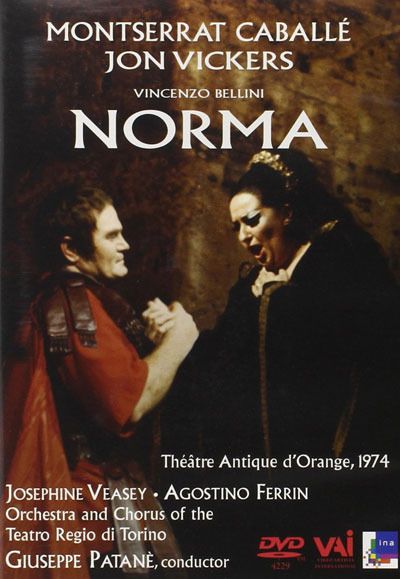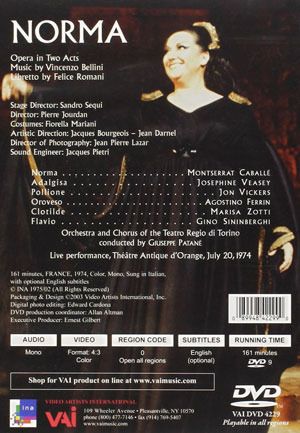09:30
Bellini: Norma / Patane, Caballe, Vickers, Veasey, Theatre Antique d'Orange [DVD]
Posted by guatchinango
Bellini: Norma / Patane, Caballe, Vickers, Veasey, Theatre Antique d'Orange [DVD]
Conductor: Giuseppe Patané | Composer(s): Vincenzo Bellini | Director: Pierre Jourdan | Performer(s): Montserrat Caballé, Jon Vickers, Joséphine Veasey, Agostino Ferrin, Marisa Zotti | Orchestra/Ensemble: Orchestra and Chorus of the Teatro Regio di Torino | Label: Video Artists International | DVD9 | Aspect Ratio: 1.33:1 | Sound format: Dolby Digital 2.0 Mono | File host: Share-online.biz | 5% recovery record + 1 .rev file | Run time: 160 minutes | 8.11 GB
Language(s): Italian | Subtitle(s): English, French, Spanish, Italian
Live performance, Théâtre Antique d'Orange, July 20, 1974
Conductor: Giuseppe Patané | Composer(s): Vincenzo Bellini | Director: Pierre Jourdan | Performer(s): Montserrat Caballé, Jon Vickers, Joséphine Veasey, Agostino Ferrin, Marisa Zotti | Orchestra/Ensemble: Orchestra and Chorus of the Teatro Regio di Torino | Label: Video Artists International | DVD9 | Aspect Ratio: 1.33:1 | Sound format: Dolby Digital 2.0 Mono | File host: Share-online.biz | 5% recovery record + 1 .rev file | Run time: 160 minutes | 8.11 GB
Language(s): Italian | Subtitle(s): English, French, Spanish, Italian
Live performance, Théâtre Antique d'Orange, July 20, 1974

Montserrat Caballe, Jon Vickers and Josephine Veasey are the featured singers in Bellini's masterpiece. Giuseppe Patane conducts the orchestra of Teatro Regio di Torino.
Watch a Trailer (sample is a lower resolution than actual DVD or Blu-ray):
About this Opera:
Oroveso, a Druid High Priest, gathers his people in a sacred forest and prays to their gods for help in vanquishing the Romans who have taken over Gaul. Unbeknownst to Oroveso, his daughter, Norma, a High Priestess, has for some time been the lover of Pollione, the leader of the Romans; she has, in fact, not only broken her sacred vow of chastity but has borne two children to the warrior. Norma uses her position to dissuade the Gauls from attacking the Romans, claiming that the gods have told her that the time is not favorable. Norma has also learned that Pollione has become interested in another woman, although her identity is unknown. That woman is Adalgisa, a young novice, who is unaware of the relationship between her new lover and Norma.
When the truth is revealed, Adalgisa rejects Pollione, who still intends to take her back to Rome with him by force. The rejected Norma considers killing her own children, who may otherwise also be forced to go to Rome with their father. She cannot go through with this, and Adalgisa tries to intercede with Pollione on Norma's behalf, but to no avail. Furious, Norma tells the Gauls that the gods have told her that they now must strike against the enemy. Pollione is captured, and Norma offers to save his life if he will give up his new lover. When he refuses, Norma informs that Gauls that she has brought dishonor upon the temple and that it is she, not Pollione, that must be put to death. Moved by her sacrifice, Pollione chooses to die alongside her.
REVIEW:
Robert Levine, ClassicsToday.com
Despite the general darkness of the picture and the antediluvian camera-work, not to mention the fact that this performance took place outdoors (at Orange's Roman amphitheater) during a mistral that threatens to uproot even Montserrat Caballé, this 1974 Norma is a must-have for anyone who cares about great singing, especially bel canto. Caballé has referred to this as the finest performance of her career, and you may well agree; indeed, outside of Callas', this is the only recording of a Norma that I have found riveting in every way. Caballé's ability to spin out incredibly long, perfectly-tuned, soft phrases is well known; in fact, in the opera's final act she begins a phrase and doesn't end it, through a multi-note melisma, for almost a half-minute. As pure sound, it boggles the mind, and the fact that she is at her most dramatically involved and authoritative, at times singing with a Callas-like intensity and brutal but appropriate chest voice (her "In mia man" duet with Pollione is spine-chilling), equals an unforgettable experience.
Jon Vickers is the Pollione, and he makes as much of the role as is humanly possible; he's in fine voice and he brings virility and total commitment to the proceedings. Josephine Veasey is not the loveliest of Adalgisas, but her somewhat edgy vocalism is more than compensated for by her dramatic connection. Agostino Ferrin's Oroveso, very darkly filmed, is sonorous and majestic. The wind blows what seems like miles of costumer Fiorella Mariani's chiffon robes exquisitely, creating a dramatic effect of its own, and the requirements made of the performers on the immense stage somehow keep everything in motion; the very still moments are all the more focused. Precisely how conductor Giuseppe Patané keeps the whole show under such tight control is miraculous--almost everything except his singers and orchestra seems to be working against him--and this is a simply great Norma. The sound is excellent mono and there are English subtitles. There were a reported 10,000 people in the audience--what a show! Do yourselves a favor and join them--you won't regret or forget it.
Works on This Recording
Norma by Vincenzo Bellini
Performer: Marisa Zotti (Soprano), Josephine Veasey (Mezzo Soprano), Jon Vickers (Tenor), Montserrat Caballé (Soprano), Agostino Ferrin (Bass), Gino Sinimberghi (Tenor)
Conductor: Giuseppe Patané
Period: Romantic
Written: 1831; Italy
Date of Recording: 07/20/1974
Venue: Théâtre Antique d'Orange, France




0 comments:
Post a Comment